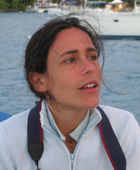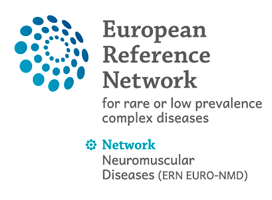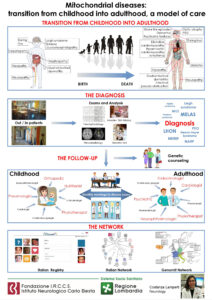30 Nov 2017
Mitochondrial diseases : Transition from childhood into adulthood, a model of care

Authors:
Costanza Lamperti (costanza.lamperti@istituto-besta.it), Anna Ardissone, MD, Child Neurology, Fondazione IRCCS Istituto Neurologico C. Besta
Lorenzo Peverelli , MD, UO Molecular Neurogenetics, Fondazione IRCCS Istituto Neurologico C. Besta
Eleonora Lamantea , PhD. UO Molecular Neurogenetics, Fondazione IRCCS Istituto Neurologico C. Besta
Daniele Ghezzi, UO Molecular Neurogenetics, Fondazione IRCCS Istituto Neurologico C. Besta
Lorenzo Maggio, UO Neuroimmunology and Muscle Diseases, Fondazione IRCCS Istituto Neurologico C. Besta
Stefania Bianchi Marzoli, UO Neuroftalmolgy, Istituto Auxologico.
Laura Farina, UO Neuroradiology , Fondazione IRCCS Istituto Neurologico C. Besta
Valeria Tiranti, UO Molecular Neurogenetics, Fondazione IRCCS Istituto Neurologico C. Besta
Barbara Garavaglia, UO Molecular Neurogenetics, Fondazione IRCCS Istituto Neurologico C. Besta
Isabella Moroni, UO Child Neurology ,Fondazione IRCCS Istituto Neurologico C. Besta
Mitochondrial Diseases (MD) are multisystem disorders where age plays a role in the involvement of various organs. During the transition from childhood into adulthood, many medical issues and concerns change and patients need a different clinical care. Thanks to expertise in both pediatric and adult pathology, the Neurological Institute C. Besta (NICB) is among the few in Italy able to take care of patients with MD from the time of diagnosis throughout the evolution of the disease, providing patients with the necessary continuity in the delicate phase of transition to adulthood. NICB provides inpatients service in the Child Neurology Division and an outpatient service for adults and child. The outpatient service allows the programming for neuroimaging, neurophysiology and blood tests, skin and muscle biopsy. Within the outpatient service, clinicians can monitor and follow up patients using new international mitochondrial assessment scales. It is also possible to have neuroftalmological and cardiological evaluation, orthopedic and pulmonary clinic with specialist consultants pertaining to structures affiliated with the Institute. Genetic counseling is provided to those families in which a patient with MD has been identified. Frequent and dedicated meetings involving all the specialists guarantee the exchange of information, essential for a correct patient’s follow-up. As part of the Italian Network of Mitochondrial Disease, we contribute to the Italian Register for Mitochondrial Diseases whose aim is to group patients into similar categories according to their diagnosis, monitoring the natural history of the disease, performing clinical trials and testing new therapeutic approaches. NICB is part of the consortium “Genomit”, coordinated by Germany, together with France, USA and Austria, whose goal, in addition to identify new disease genes and new therapeutic strategies, is to unify and integrate the Italian Registry for MD with other national registers of the Member States and to share diagnostic, therapeutic and clinical approaches. www.mitopedia.org


